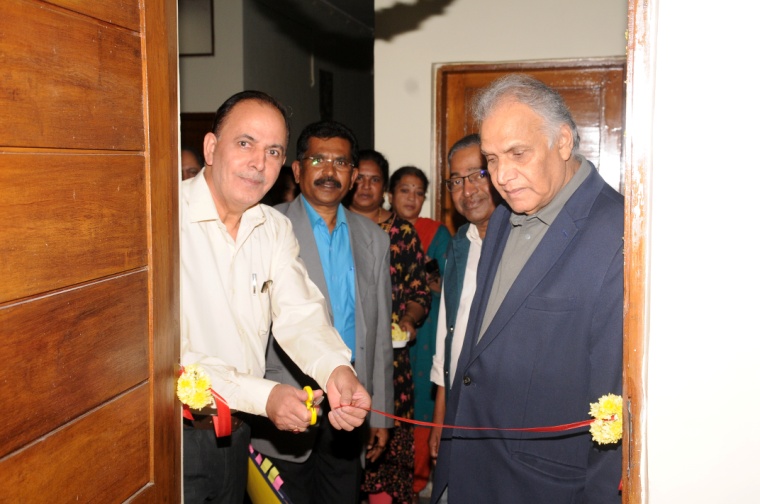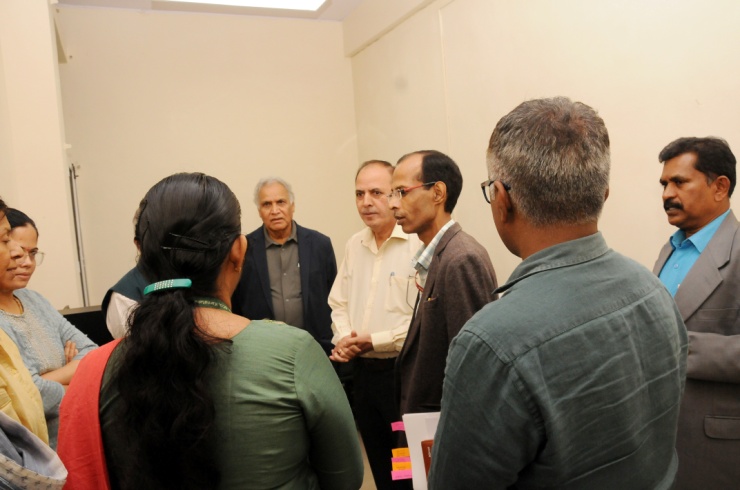|
|
|
|
CENSUS DATA RESEARCH WORKSTATION
POPULATION RESEARCH CENTRE, ISEC
I: INTRODUCTION
The Population Research Centre (PRC) at ISEC had the privilege of establishing the Census Data Research Workstation with financial support from the Union Ministry of Health and Family Welfare (MoHFW), Government of India, and in collaboration with the Directorate of Census Operations/ Citizen Registration, Ministry of Home Affairs, Karnataka. This facility was officially inaugurated at PRC, ISEC, on November 8, 2024, by the esteemed Director General, Shri. Kal Singh, MoHFW, Government of India.


The Indian Census, recognized as the largest single source of statistical information on various demographic, social, and economic characteristics of the population, has a legacy spanning over 130 years. Initiated in 1872, this reliable and time-tested exercise provides comprehensive insights into the nation’s population every decade. It has been a valuable resource for scholars and researchers across diverse disciplines, including demography, economics, anthropology, sociology, and statistics. The decadal census captures the rich diversity of India’s population, serving as an indispensable tool for understanding and analyzing the dynamics of the nation.
II. OBJECTIVE OF CENSUS WORKSTATION
-
To provide qualified researchers with optimal access to anonymized micro-data from the Census, enabling in-depth research through the generation of cross-tabulations not published by the Census.
-
To provide access of the workstation facility to all researchers, including those who are not enrolled or part of the Institute, facilitating the broad use of Census micro-data.
-
To enhance the utilization of Census data by enabling the generation of cross-tabulations from confidential micro-data, this cannot be achieved using the publicly available aggregate-level data.
-
To promote in-depth studies that may contribute to improving the methodology of data collection during the Census and help identify strengths and weaknesses in the micro-data.
III. CENSUS MICRODATA
“Microdata” refers to information provided by one individual respondent at the time of the Census. These are made available after anonymizing sensitive fields and location particulars to avoid the identification of the respondent. Sample Micro Data from House listing and Housing Census in Census 2001 have been made available at the Workstation providing Household-level information. Other Sample Micro Data Files from Census 2001 & Census 2011 will be made available in due course.
Sample Micro Data are of two types:(i) National level sample (1% sample) and (ii) State level sample (5% or 10% sample depending on the population size of the State). It is possible to generate Tables at India/State level using the National level sample (1%). Similarly, one may generate State/District level tables using the State level samples (5% or 10%). CSPro software has also been made available to generate tables. At the Workstation, the facility is extended to researchers to use the database for generating any cross-classified tables required by the researcher. It facilitates research and allows proving a hypothesis formulated by the researcher.
IV. FACILITIES AVAILABLE
The workstation is fully equipped with all the facilities for research on confidential micro-data from Census 2001, Census 2011 & onwards. Along with the Micro data, researcher can access to Excel Tables (from year 1991 to 2011) and Census reports (from 1872 to 2011).
The workstation will be fully air-conditionedwitha network of computer terminals for accessing the data. The Nodal Officer at PRCwill be the key person to provide access to the data sets required in the approved research proposal.The researcher will be permitted to use only the software made available at the workstation for tabulation. The researchers may also use the printer installed in the workstation to print the approved outputs. She/he will, however, not be allowed to take out the soft copy of the micro-data in any format.
V. STEERING COMMITTEE
For examining the research proposals received from scholars, students or any other person for undertaking research, a Steering Committee will be examining the proposals to provide necessary micro data to researchers. The Steering Committee will meet regularly to examine the research proposals received at the workstation and accord permission for research, if found suitable. The facilities available at the workstation will only be open to researchers whose research proposal has been accepted and approved by the Committee. In case, the dataset is not available at the workstation, or up to the time it is not available, the facultyin-Charge would forward the request for generating cross tabulations to the Data Dissemination Unit, Office of the Registrar General &Census Commissioner, India, New Delhi for consideration. If approved by the Census Commissioner, India the tables would be generated at the ORG&CCI and made available to the research scholar. The SteeringCommittee would make its own rules for operating the workstation.
VI. PROCESS TO ACCESS THE DATA
The Workstation will function under the supervision and control of the Institute. A research proposal is to be submitted by potential users. Postgraduate students, Research Scholars, faculty members of academic institutions and members of research organizations may apply. Students will be encouraged to use the Workstation.
-
Applications must be duly endorsed by Heads of Department / Supervisors, as relevant (sending hard copies by postal address are also permitted. On arrival at the workstation, the candidate must supply the originals).
-
Applications must mention the tentative duration/period (to be confirmed only after approval) of a visit.
-
The candidate should show a valid Identification at the time of arrival.
The proposal should comprise the following:
-
Background information of the researcher (including age, gender, highest qualification, affiliation, address, and email id).
-
Study objectives with relevant methodology.
-
Statement of purpose (100 – 150 words)
-
Specific data requirement.
VII. LOCATION
The workstation is located at the following address:
Population Research Centre,
Institute for Social and Economic Change (ISEC),
Dr. V.K.R.V. Rao Road, Teachers Colony,
Nagarbhavi, Bangalore- 560072
VIII. DO’S AND DON’T FOR THE USERS:
The researcher has to work under the supervision of the Committee.
-
Security of data has to be ensured. Copying of data will not be permitted.
-
Only final outputs from the research, after vetting from the Steering Committee, will be allowed to be printed and taken out.
-
The Workstation will not be connected to the Internet.
-
No fee will be required to be paid.
IX. CONTACT PERSON
To get the required data from Census Data Research Workstation, the research scholars, students or any person for undertaking researchmay submit the hard copy of the research proposals along with the forwarding letter by the concern Head of the Department in Universities/Research Institutes may submit to the following designated person at PRC, ISEC, Bangalore.
Prof C M Lakshmana
Nodal Officer
Census Data Research Workstation
and Head, Population Research Centre,
Institute for Social and Economic Change (ISEC),
Dr. V.K.R.V. Rao Road, Teachers Colony,
Nagarabhavi, Bangalore- 560072
Supporting Staff
Mr. Devindra,
Research Investigator, PRC
Ms. Madhu Bidari,
Research Investigator, PRC




